HPS-BEST Students
Current Research Assistants in the HPS-BEST Laboratory
- Pratik Deokar (Ph.D. Candidate)
- Ellyn Harges (Ph.D. student)
- Burak Adanur (MS Student)
- Ford Gibbs (Undergraduate Student Research Assistant)
- Amy Strong (Undergraduate Student Research Assistant)
- Greg Panowicz (Undergraduate Student Research Assistant)
Students Bio and Overview of Their Research Projects.
Pratik Deokar, Ph.D. Candidate (2014 to present)

email: psd0009@auburn.edu
Address: Woltosz 0542
Phone: 334 844-3315
Research: New Energy Efficient Nano-Refrigerants: Thermodynamics and Heat Transfer During Two-Phase Flow Phase Change Phenomena
Abstract: In vapor compression based air conditioning and refrigeration systems, a small amount of the compressor lubricating oil is carried with the refrigerant and it circulates to the system components. In heat exchangers, oil is a contaminant that decreases heat transfer rates and increases pressure losses. Nanorefrigerants, i.e., metal nanoparticles dispersed in the refrigerant and lubricant mixture can augment the energy efficiency of heat exchangers. Research objectives are to study the effects of nanoparticles shape, concentration, heat flux, and mass flux on heat transfer coefficient (HTC) and pressure drop (ΔP) during two-phase flow boiling of nano-refrigerants.
Experiential Setup:
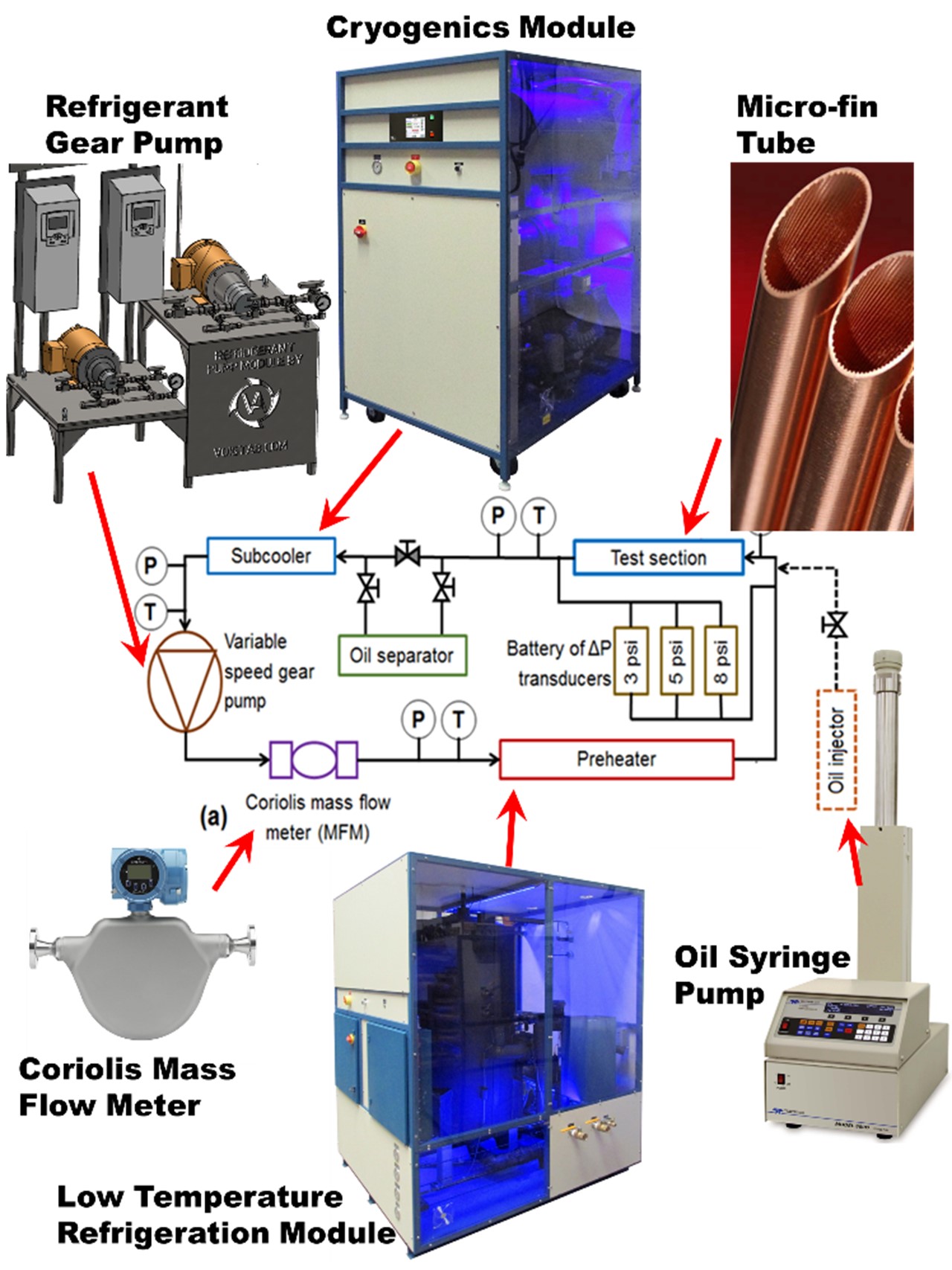
Some Main Findings:
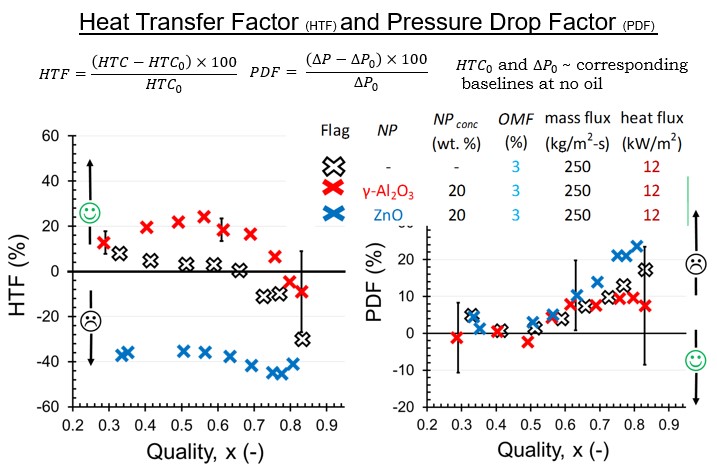
γ-Al2O3 nanolubricants provided +20% HTC enhancement with no or very small penalization of the pressure drop. ZnO (non-spherical) nanolubricants with similar thermal conductivity had lower HTC than POE oil and γ-Al2O3 based nanolubricants. Thermal conductivity was not the sole property responsible for the HTC intensification, and other mechanisms are present. Heat transfer increased while the pressure drops were very small, this showed nano-refrigerants to have excellent potential for energy efficiency.
Pratik Bio:
Education:
- Ph.D. Mechanical EngineeringThesis Advisor: Dr. Lorenzo Cremaschi.
Research Work: Study of thermodynamics and heat transfer characteristics of two-phase flow boiling of the nano-refrigerants.
Oklahoma State University (Aug 2014 – Dec 2015) and Auburn University (Jan 2016 to Present) - M.S. in Mechanical Engineering (Aug 2010 - July 2013)M.S. Thesis title: “Development of an Experimental Methodology for Measurement of Oil Retention and its Effect on the Microchannel Heat Exchanger”
Thesis Advisor: Dr. Daniel Fisher, Co-Advisor: Dr. Lorenzo Cremaschi.
Oklahoma State University-Stillwater, Oklahoma, USA - B.E. in Mechanical Engineering (May 2006 – May 2010)Research Work: Tested a micro-fin tube condenser in a refrigeration system to verify enhancements in the heat transfer coefficient.
Advisor: Dr. Pradeep A. Patil.
Pune University-Pune, India
Experiences:
- Graduate Research Assistant
- BETSRG (Building and Environmental Thermal Systems Research Group), Oklahoma State University (Aug 2011 – July 2013, Aug 2014 – Dec 2015)
- HPI-BEST (High Performance Integrated Building Energy Systems and Technologies), Auburn University (January 2016 – present)
- Graduate Teaching Assistant
MAE 3223-Thermodynamics II (Spring 2011, Oklahoma State University), and MAE 4703-Design of Indoor Environmental Systems (Fall 2014, Oklahoma State University), and MECH 3020-Thermodynamics II (Spring 2017, Auburn University)
Professional Societies Membership:
ASHRAE member (American Society of Heating, Refrigerating and Air-Conditioning Engineers) (2011 – present)
Journal Papers
- Bigi, A., M., Cremaschi, L., and Deokar, P., 2016, Nanolubricants flow boiling heat transfer enhancement in a micro-grooved tube evaporator, Science and Technology for the Built Environment (formerly the HVAC&R Research Journal), (in review as of Nov 2016).
- Yatim, A., Deokar, P. S., and Cremaschi, L., 2016, Oil retention in a microchannel type condenser and its effects on heat transfer rate performance and on the pressure drop. Science and Technology for the Built Environment (formerly the HVAC&R Research Journal), Vol. 23, issue 1, pp. 1-15, accepted author version posted online 14 Sept 2016, ISSN: 2374-4731 print / 2374-474X online, DOE: 10.1080/23744731.2016.1221447
- Cremaschi, L., Bigi, A., A., M., Wong, T., and Deokar, P., 2015, Thermodynamic Proprieties of Al2O3 Nanolubricants: Part 1, Effects on the Two Phase Pressure Drop, Science and Technology for the Built Environment (formerly the HVAC&R Research Journal), Vol 21, 607-620, ISSN: 2374-4731 print / 2374-474X online; DOI:10.1080/23744731.2015.1023165
Conference Papers
-
- Cremaschi, L., Deokar, P., and Bigi, A., A., M., and 2017, Two phase flow boiling heat transfer coefficient and pressure drop of refrigerant and γ-Al2O3 based nanolubricant mixtures in a 9.5 mm smooth tube, Proceedings of the 2nd Thermal and Fluid Engineering Conference, TEFC2017, Las Vegas, NV (USA), April 2-5, Paper No. 17456, Pages 1-15.
- Deokar, P., Cremaschi, L., Wong, T., and Criscuolo, G., 2016, Effect of Nanoparticles Aspect Ratio on the Two Phase Flow Boiling Heat Transfer Coefficient and Pressure Drop of Refrigerant and Nanolubricants Mixtures in a 9.5 mm Micro-fin Tube. Proceedings of the 16th International Refrigeration and Air Conditioning Conference at Purdue University, West Lafayette, IN (USA), July 11-14, Paper No. 2098, Pages 1-10.
- Smith, J., Wong, T., Deokar, P., and Cremaschi, L., 2015, Heat Transfer and Pressure Drop of New LGWP Refrigerants and Lubricant Mixtures in a 9.5 mm micro-fin evaporator tube, 2015 ASHRAE Transactions, ASHRAE Conference Paper No. AT-15-C027, ASHRAE Annual Conference, Atlanta, GA, USA, Jun 27-Jul. 1.
- Bigi, A., M., A., Wong, T., Deokar, P., and Cremaschi, L., 2015, Experimental Investigation on Heat Transfer and Thermophysical Properties of Mixtures of Al2O3 Nanolubricants and Refrigerant R410A, 2015 ASHRAE Transactions, ASHRAE Conference Paper No. 15714, ASHRAE Winter Conference, Chicago, IL, USA, Jan 24-28.
- Cremaschi L., Wu, X., Biswas, A., Deokar, P., 2013, Experimental study of compressor operating characteristics and performance when using refrigerants R32, R1234yf, and two new low GWP developmental refrigerants as drop-in replacements for R410A, Int. Conf. on Compressors and their Systems, City University of London, UK, Sept 9-10.
- Chandrasekharan, R., Lee, E. S., & Deokar, P. S. (2013). An enhanced simulation model for building envelopes with phase change materials. ASHRAE Transactions, 119, C1.
Research Interests
Heat exchangers, Nanofluids, Boiling, Refrigerants, and Nano-refrigerants
Interest and Hobbies:
Pipe Soldering for fluid lines and system component installation
Watching Documentaries and Scientific Channels on YouTube.
Ellyn Harges, Ph.D. student (2017 to present)

email: enh0015@tigermail.auburn.edu
Address: Woltosz 0542
Phone: 334 844-3315
Research:
Motivations:
- Frost degrades the performance of systems such as heat pumps, automobiles, and airplanes.
- Frost causes inefficiencies due to an added thermal resistance, blockage of air flow through heat exchanger fins, and the need for defrosting.
Objectives:
- To present a new data set for frosting of flat plates and louvered fins which have super-hydrophilic, super-hydrophobic, and super-biphilic surface coatings.
- To model frost growth on both flat plates and fin structures when super-hydrophilic, super-hydrophobic, and super-biphilic coatings are present.
- To use the experimental and modeling results to make recommendations for surface coating types that will improve system efficiency under frosting conditions.
A new 3-Stage Frost Model developed under this research project:
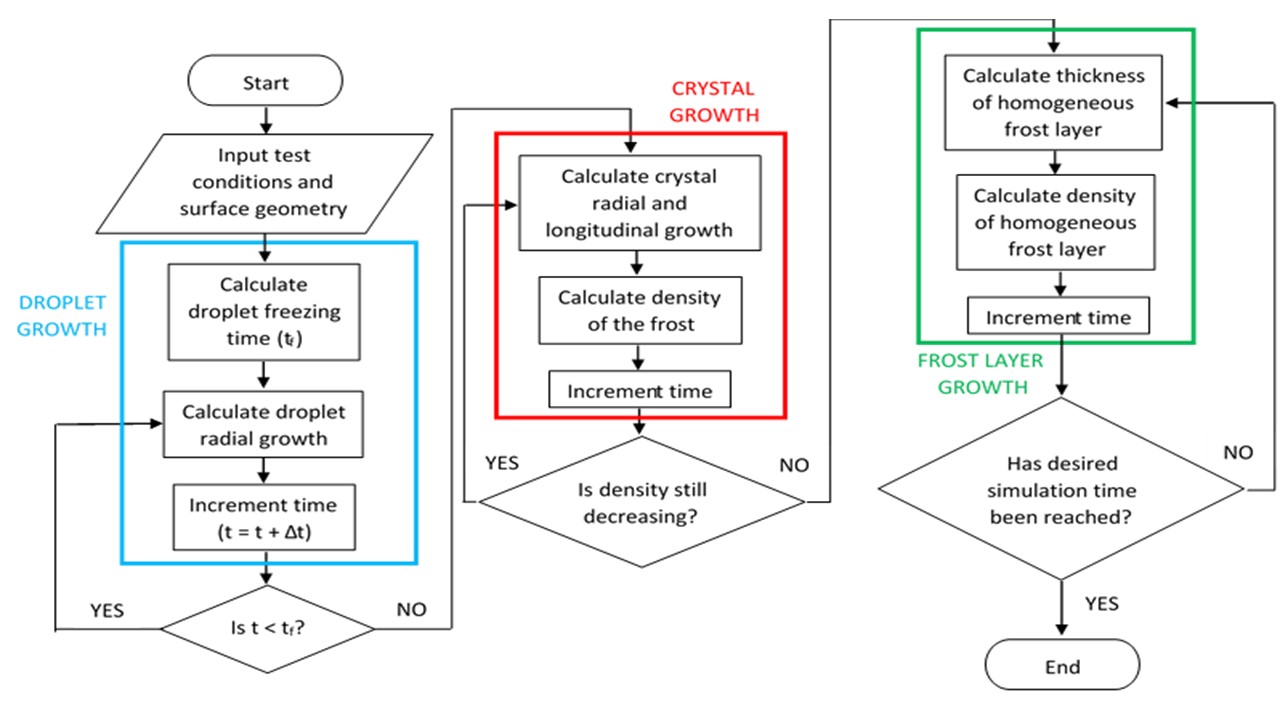
Some images from the frost experiments:
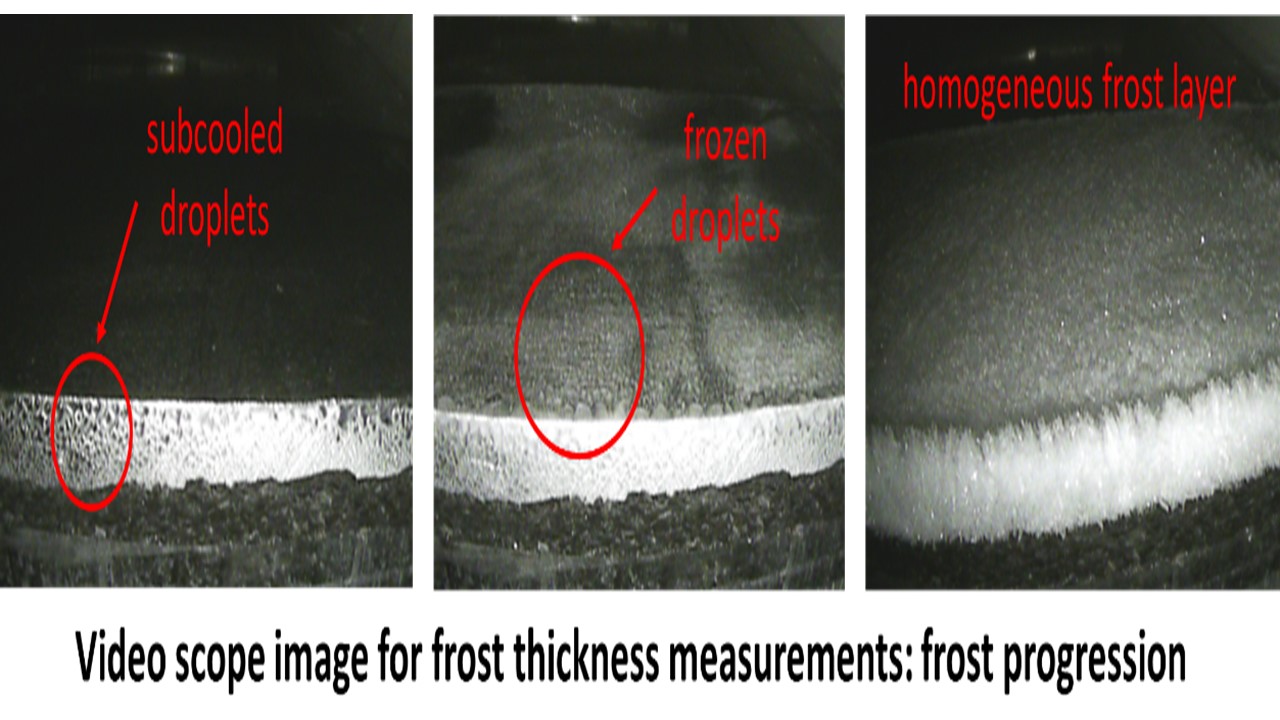
Infrared camera image for droplet size and frost surface temperature measurements
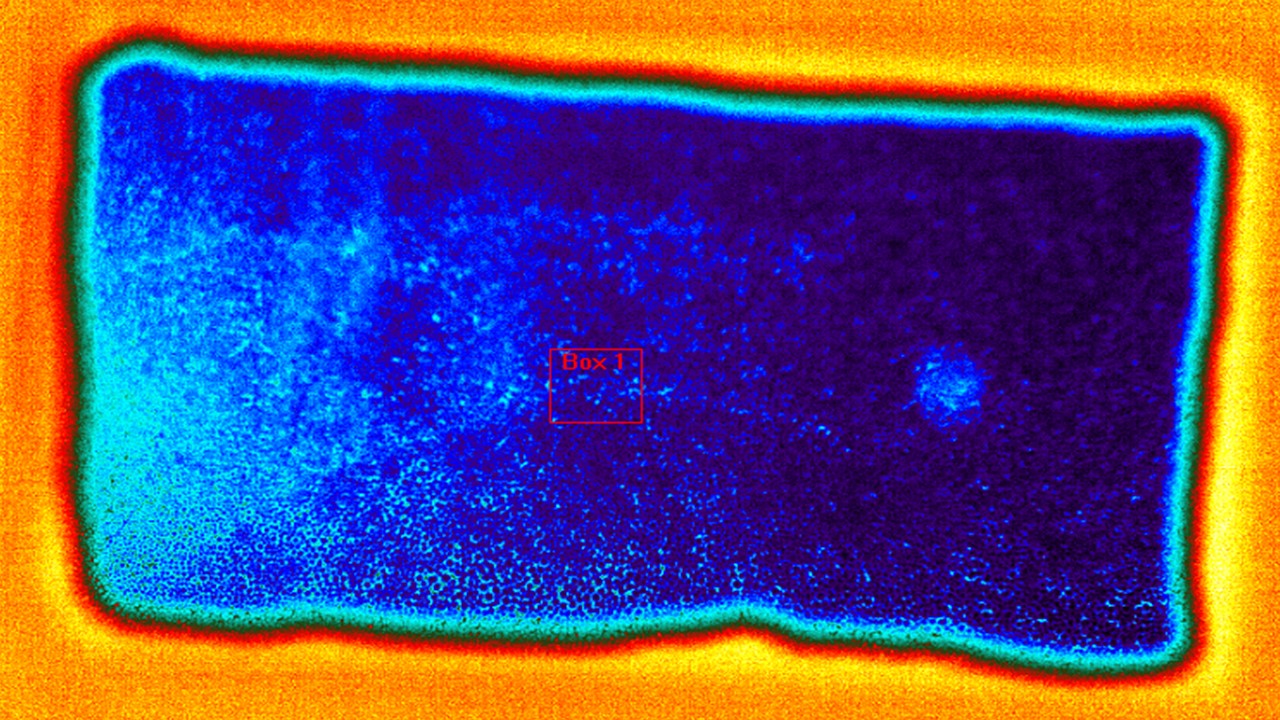
Ellyn Bio:
I attended Oklahoma State University (OSU) for 6 ½ years, where I earned B.S. and M.S. degrees in Mechanical Engineering. At OSU I also met my wonderful husband, Will Harges. I am now a second year PhD student in Mechanical Engineering at Auburn University, and work under Dr. Lorenzo Cremaschi. I am currently employed as a graduate research assistant, but have worked as a teaching assistant in thermodynamics and heat transfer courses for several semesters in the past and really enjoyed it. My research interests include thermodynamics, heat transfer, fluid flow, and simulation work. To date my research has been focused on HVAC applications, but I would love to study these topics in other areas of industry as well. When not busy with class or lab work, I enjoy reading, traveling, playing music, and spending time with family and friends.
Publications:
- Harges, E., and Cremaschi, L., 2018. “A new model for frost growth incorporating droplet condensation and crystal growth phases.” 2018 ASHRAE Winter Conference, Chicago, IL. Accepted for publication.
Burak Adanur, MS Student (2017 to present)

email: bma0006@auburn.edu
Address: Woltosz 0542
Phone: 334 844-3315
Research: Frost development on hydrophobic, hydrophilic, and biphilic surfaces. A major source of inefficiency in modern air conditioning systems comes from frost development on the fin surfaces of heat exchanger coils. This frost growth requires the air conditioning system to stop working, actively melt the frost and then restart, repeating this cycle many times a day.
My research is on finding out how frost may develop differently if we were to apply a coating on the frosting surface. These coatings may potentially develop frost more slowly or evenly, or we may see that the coatings help to defrost the plate more quickly. Each of these outcomes would allow the heat exchanger to spend more time cooling air and less time melting frost thus increasing the efficiency.
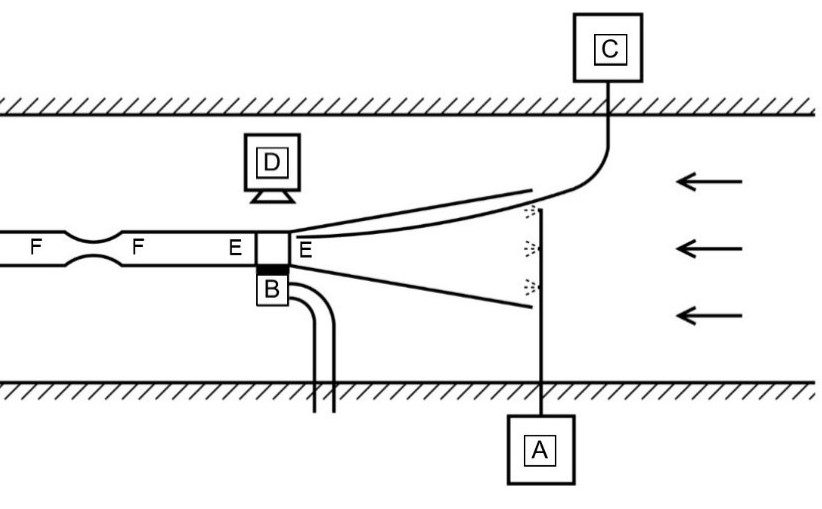
Test Apparatus Diagram. A) Steam generator, B) Frost Plate Apparatus, C) Videoscope, D) IR Camera, E) Test Section Inlet and Outlet, F) Outlet Nozzle Inlet and Outlet.
We use an assortment of measurement and imaging equipment including an infrared (IR) camera, a videoscope, and numerous temperature, pressure, and dew point sensors in order to collect precise and accurate information from our experiments.
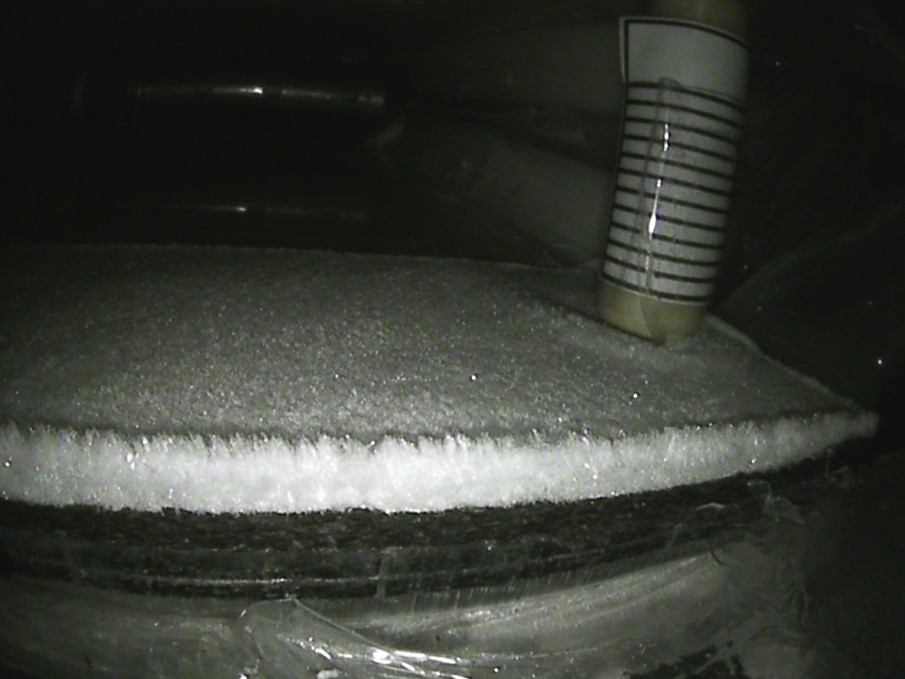
Picture of frost growth on a flat plate during experiment.
Burak Bio:
I was born and raised in Auburn AL. My interests include running, movies, cooking, traveling, and Auburn Football.
Ford Gibbs, Undergraduate Student Research Assistant (2017 to present)
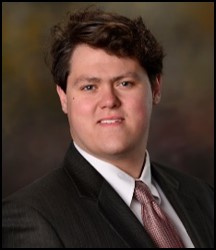
email: cdg0022@auburn.edu
Address: Woltosz 0542
Phone: 334 844-3315
Research: Design and Development of a Low Temperature Tube Calorimeter for Ammonia Refrigerants
The objectives of my research project are as follows:
-
-
- Completion of LGWP Refrigerant Experimental Test Setup
- Conduct Tests, and Perform Data Analysis and Reduction
- Use Test Data to Create Models for Two-Phase Flow of LGWP Refrigerants in 180° U-Bends
-
Some images of the CAD 3-D rendering of the U-bend:
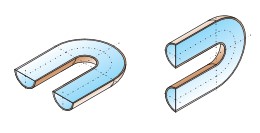
Ford Bio: Major in Mechanical Engineering
Interests in Thermodynamics and Fluid Mechanics
Amy Strong, Undergraduate Student Research Assistant (2017 to present)
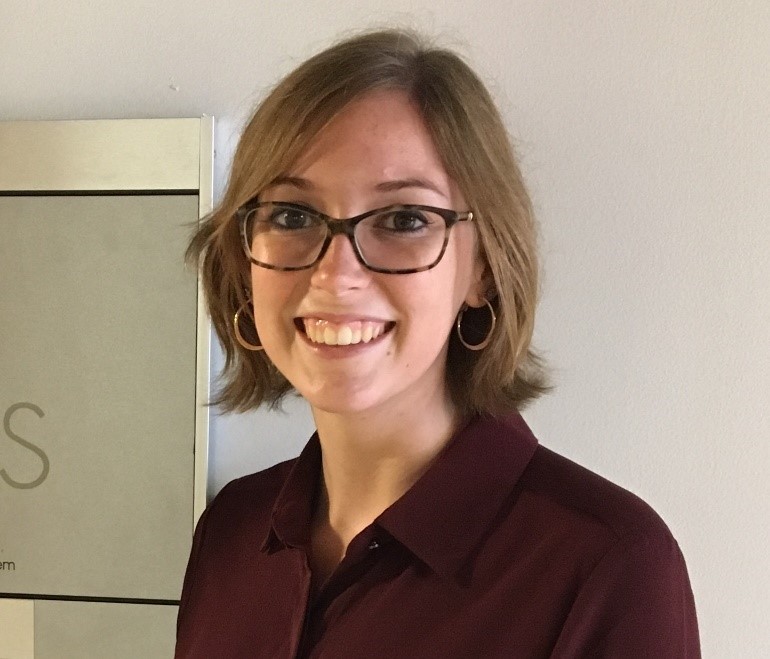
email: aks0043@tigermail.auburn.edu
Address: Woltosz 0542
Phone: 334 844-3315
Research: Frost formation and density is generally studied in the context of the typical environmental conditions of cold humid air. However, the study of frost formation in abnormal conditions is also impactful on industry. While cold, humid air conditions are related to fields like HVAC, more abnormal conditions can be applied to the aircraft industry. I am researching how water droplets of different dimensions in the airstream affect frost formation, particularly in the initial frost growth phase. The understanding of this frost formation can lead to better ways to prevent frost build up in various applications. A study emphasizing the initial frost phase will improve preventative measures for frost growth.
Amy Bio:
I am an undergraduate mechanical engineering student at Auburn University. My interests include thermodynamics, heat transfer, and system dynamics and controls. In addition to working in the lab, I also work at the Auburn Rec as a yoga teacher. When not on campus, I enjoy reading, watching movies, and hanging out with friends.
Greg Panowicz, Undergraduate Student Research Assistant (2018 to present)

email: glp0002@auburn.edu
Address: Woltosz 0542
Phone: 334 844-3315
Research
Construction and Calibration of Nanolubricant Tube Calorimeter to Study Refrigerants and Nanolubricants Mixture Two-Phase Flow Heat Transfer,
Greg Bio:
I am currently a junior majoring in Mechanical Engineering. I am originally from Lowville, New York. I really like to study energy transfer and also the flow of systems. My hobbies include playing tennis, playing soccer, and also being involved in the Fellowship of Christian Athletes.
Past Recent Graduate Research Assistants in the HPS-BEST Lab.
- Andrea Bigi (Ph.D. in ME, 2013 to 2018)

email: abigi@auburn.edu
Research: My research aims at understanding the mechanisms responsible for heat transfer intensification during two-phase flow processes when nanoparticles of metal oxides are dispersed in a oil-refrigerant mixture. The project includes the collection of a set of experimental data that document the effects of the nanoparticles on the two-phase flow heat transfer coefficient and pressure drop, and the development of a theoretical model that captures the effects of the nanoparticles.
Andrea Bio: After graduating in Energy Engineering from Polytechnic of Milan, Italy, I moved to the USA to start a PhD on nanofluids for enhanced heat transfer in HVAC&R applications.
I was co-founder of the Auburn University ASHRAE student branch.
Past Recent Undergraduate Research Assistants in the HPS-BEST Lab.
Alyssa Fink, Undergraduate Student Research Assistant, ME Senior (2016/17)

Project: Design and Construction of Test Set Up for Frost Experiments of Coated Flat Plates.
Morgan Price, Undergraduate Student Research Assistant, ME Junior (2016/17)

Project: Design and Construction of Dew Point Meter Probes and Air FLow Nozzle Test Apparatus for Psychrometric Ice Wind Tunnel.
